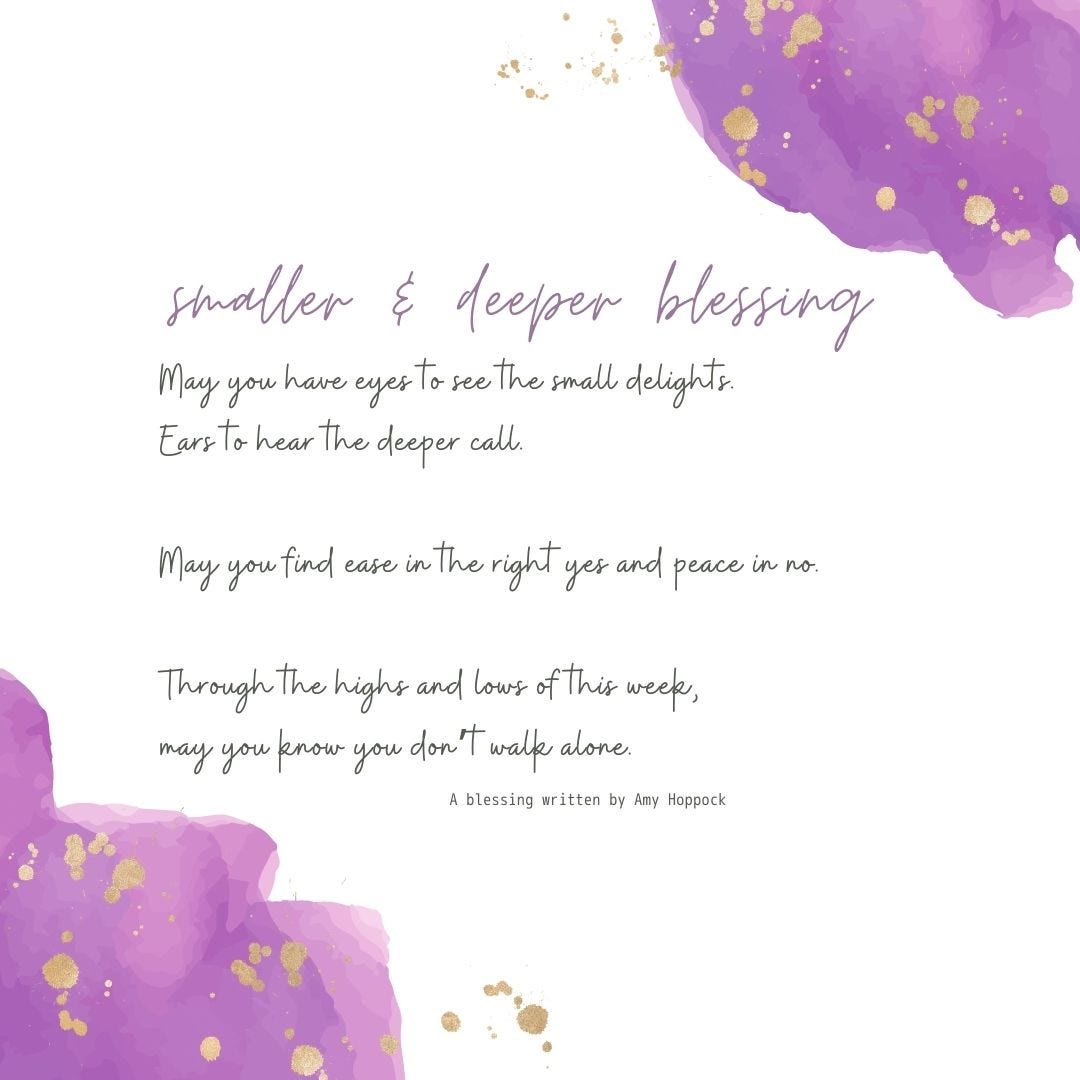A Weekly Practice
More on the Examen
“Whatever may be the tensions and the stresses of a particular day, there is always lurking close at hand the trailing beauty of forgotten joy or unremembered peace.”
― Howard Thurman, Meditations of the Heart

The Examen is an ancient prayer and reflection practice from St. Ignatius of Loyola. Its very essence is a smaller and deeper practice. I’ve written about a daily examen practice here. I was reminded of the weekly examen practice by Marcie from the wonderful newsletter Black-Eyed Bible Study.
The invitation this evening is to engage in a short weekly examen practice. It’s an opportunity to pause and remember. The Examen, by definition, is a short practice. It’s designed to be a simple tool that helps us harvest the good and learn from the challenges. The reward of this practice is the pause allows us to see where joy was and where challenges were. We can see how joy (peace or hope) fuels us and surprises us. We can also recall how our challenges were difficult and how we integrated them, learned, and moved forward. The Examen looks for the small moments and then looks deeper into those moments to harvest the lesson. There is peace and calmness from this practice. I hope you’ll take a few minutes right now to engage in a weekly examen practice.
A Weekly Examen
Step 1: Take a few minutes to center yourself and just breathe. Arrive in the moment.
Step 2: Review the past week from Sunday to Saturday. What did each day hold? You are just reviewing the week to get an overview. What did Sunday look like? What did Monday look like, and so on? Notice any events or moments that seem to especially catch your attention. (This doesn’t have to take a long time, it’s just a fast-forward overview of your week!)
Step 3. Look for moments of alignment. These are moments when you felt peace (or hope, joy, contentment, a sense of community-whatever you need to find). Fast forward through your week again; this time, you are looking for moments of alignment when you felt peace, pause at each moment that stands out to you and notice what caused it to be a peaceful moment (or a joyful moment, or a hopeful moment-). I like to think of this as looking at the entire scene, what came before, what came after? Be open to surprise. You might be surprised at where you find these moments. That is part of the learning!
How did you live in those moments-did you know at the time it was a moment of grace?
What lesson do the moments of alignment have for you in the upcoming week?
Step 4: Look for moments where there wasn’t alignment. You are looking for moments that feel sad, heavy, lonely, frustrating. Not to wallow in those moments but to learn from them, harvest them, and find hope.
How did you move forward?
What small glimmer of hope helped you to move forward?
Step 5: Look forward. Take a minute or two to consider the upcoming week.
What do you hope for?
What do you need?
What did you learn about the past week that you can carry into the contours of the upcoming week?
Step 6: Close with gratitude for the ways you were sustained, protected, and blessed, and look forward with those lessons in your heart.
May you find moments of joy and peace as you look back with gentle eyes.
May you be surprised with the abundance of peace, joy and hope you find.
May you hold your challenges with compassion and as you look wider, may you see how each challenge was met with grace.
May you see you didn’t (and don’t) walk alone.
Consider a daily practice of Examen. Here is a printable guide for a daily examen practice.

These Precious Days by Ann Patchett
This is Ann Patchett’s newest book of essays. I enjoy essays, and Ann Patchett is an excellent essayist. We’ve been living in pandemic times long enough that books are being published about it. This book included her reflections on living in and through the pandemic, among many other reflections.
“People want you to want what they want. If you want the same things they want, then their want is validated. If you don’t want the same things, your lack of wanting can, to certain people, come across as judgment.”
― Ann Patchett, These Precious Days: Essays
Oh, William! By Elizabeth Strout
This is a pretty small fiction book, but it’s so good. I think Elizabeth Strout is such a good writer. She is the author of Olive Kitteridge and Olive, Again, both books I loved in 2021. Oh, William is the story of Lucy Barton, an author accompanying her ex-husband on a trip to Maine to find his half-sister that he didn’t know existed until he did a genetic test that his daughters had given to him. Lucy (the narrator) is quirky and insightful. I found it an entertaining, easy read. There are two more Lucy Barton books that I’m adding to my queue. (My Name is Lucy Barton, and Anything Is Possible (I have heard this one is a challenging read with heavy subject matters.)
“But we are all mythologies, mysterious. We are all mysteries, is what I mean.
This may be the only thing in this world I know to be true.”
― Elizabeth Strout, Oh William!
And because this made me laugh:
“AM I THE ONLY ONE RUNNING OUT OF PEOPLE I LIKE?”
― Elizabeth Strout, Oh William!
I’m looking for a couple more people to help me complete my Spiritual Director training this year. If you are interested in Spiritual Direction or know someone who might be interested I would love to connect with you and talk more!
Here is a brief overview of my understanding of Spiritual Direction and what to expect.
I try and pay attention to words or phrases that stand out to me in my reading and listening. There is a spiritual practice called Florliledgium that collects short, interesting pieces {words that “sparkle” up} and put them together. This is kind of like that. Watching for things that sparkle. Gathering them and seeing how they work together and what message, mantra, or new idea might arise.)
A Practice:
Read slowly.
Notice if a word or phrase stands out to you.
How do the words make you feel?
Is there an invitation?
(I’m sharing in italics the lines that stand out to me in these passages. Maybe it’s the same, or maybe it’s different, there is much food for thought in each of these passages)
“The further I wake into this life, the more I realize that God is everywhere and the extraordinary is waiting quietly beneath the skin of all that is ordinary. Light is in both the broken bottle and the diamond, and music is in both the flowing violin and the water dripping from the drainage pipe. Yes, God is under the porch as well as on top of the mountain, and joy is in both the front row and the bleachers, if we are willing to be where we are.”
― Mark Nepo, The Book of Awakening: Having the Life You Want by Being Present to the Life You Have
“Never be so focused on what you're looking for that you overlook the thing you actually find.”
― Ann Patchett, State of Wonder
“All too often we bemoan our imperfections rather than embrace them as part of the process in which we are brought to God. Cherished emptiness gives God space in which to work. We are pure capacity for God. Let us not, then, take our littleness lightly. It is a wonderful grace. It is a gift to receive. At the same time, let us not get trapped in the confines of our littleness, but keep pushing on to claim our greatness. Remind yourself often, “I am pure capacity for God; I can be more.”
― Macrina Wiederkehr, A Tree Full of Angels: Seeing the Holy in the Ordinary






